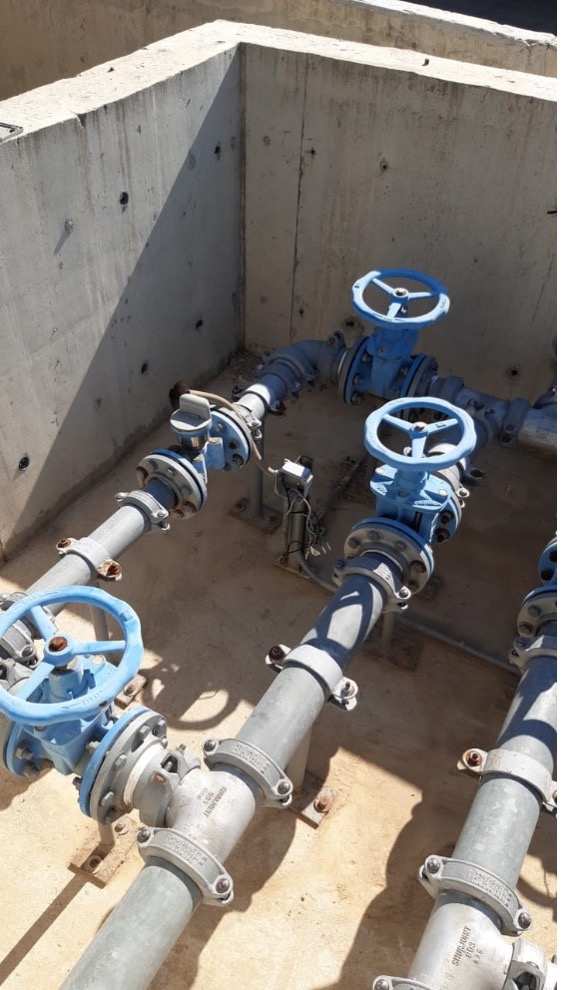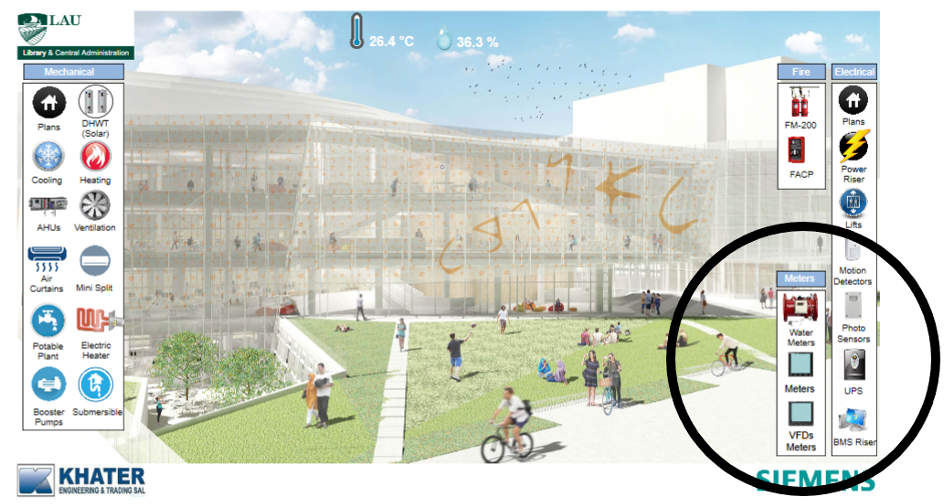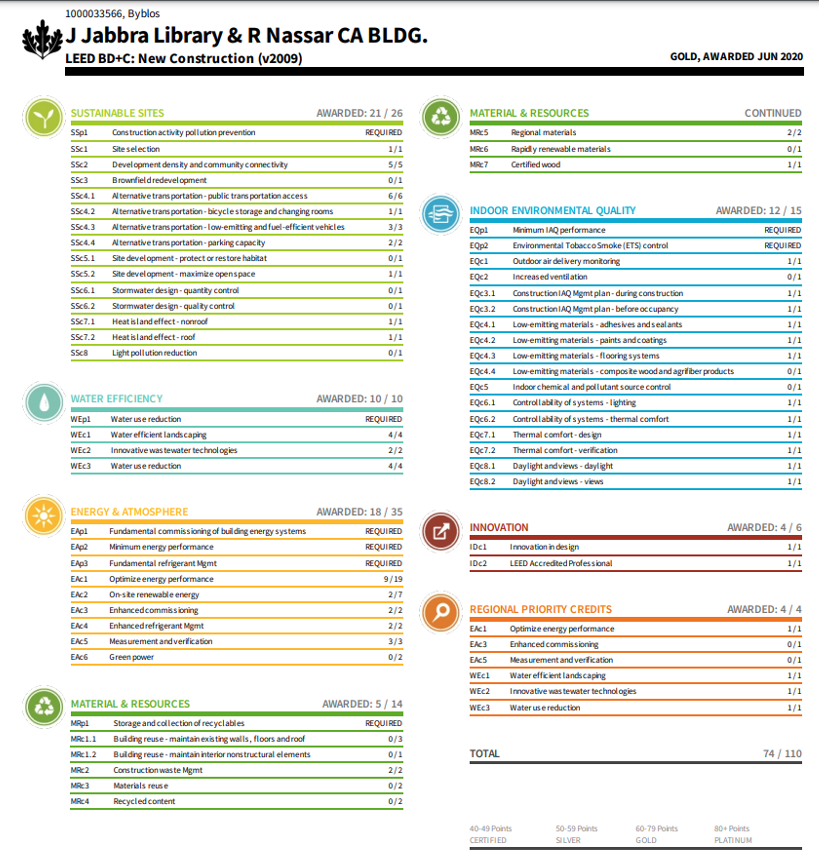Water Reuse
Water reuse
Policy to maximise water reuse
Efficient water management is an essential pillar of sustainability at LAU, where it operates large campuses with diverse water demands. A policy to maximize water reuse can not only reduce consumption but also demonstrate environmental leadership.
At the Byblos Campus, wastewater and rainwater are being effectively reused for irrigation and other purposes. LEED certification for the Byblos Library and Riyad Nassar Central Administration project highlights this commitment, awarding a perfect score for wastewater reuse under innovation. The campus also features advanced systems, such as wastewater treatment plants, rainwater harvesting, and low-flow sanitary fixtures, reducing water use by up to 35%.
Beyond individual projects, the university actively implements initiatives like water-saving devices, metering, and a comprehensive master plan to enhance water conservation and efficiency. These efforts are part of a broader sustainability strategy, addressing not just water but energy use and environmental awareness across the community.
Water Efficiency and Re-use:
https://fm.lau.edu.lb/sustainability/energy-saving-and-water-conservation/
Projects are implemented to reduce water consumption, harvest rain water and recycle water for irrigation.
- We have tested water saving devices in offices and dorms and implemented the same at the Tohme-Rizk building in Byblos as a pilot project, achieving savings of around 29 percent.
- Our Byblos campus features wastewater treatment plants. Treated water is being reused for irrigation, which will be further increased with the upcoming Byblos infrastructure project.
- The Byblos Library and Riyad Nassar Central Administration project features rain water harvesting and reuse.
- The Byblos Library and Riyad Nassar Central Administration project has been designed with low flow sanitary fixtures, achieving 35 percent water use reduction.
- We have surveyed all the water fixture types on the Byblos campus and are currently drafting a master plan to determine and implement possible further water saving measures.
Energy Saving and Water Conservation

Energy Saving
Currently LAU consumes around 24 million kilowatt-hours (kWh) of electric energy and 5 million kWh of thermal energy per year, generating the equivalent of the CO2 emissions produced by around 7,000 cars.
Recognizing the importance both of environmental sustainability and of maximizing our community’s ability to work to its fullest capacity, we are constantly exploring ways to conserve energy, operate efficiently, and introduce renewable energy sources

Water Conservation
 |
Our campuses use around 100,000 m3 of water annually, enough to fill nearly 40 Olympic swimming pools. We are tirelessly working to reduce our water consumption, harvest rain water and recycle gray water for irrigation. |
Here is what we are doing to achieve these goals:
Green Awareness
We are continuously sensitizing the LAU community about the importance of energy and water resources and their conservation and actively engaging them in this endeavor.
 |
We have launched an awareness campaign with tips for saving water on campus, in dorms, or at home. Posters were placed in restrooms and on bulletin boards throughout LAU, coupled with a short video on campus TV screens, the LAU website, and social media channels. |
 |
On August 26, 2022, the LAU Facilities Management Department in collaboration with the Association of Energy Engineers – Lebanon Chapter organized a site tour for LAU and non-LAU students. This initiative was part of the “internship in energy and sustainability” program by AEE Lebanon. Interns got the chance to tour the Byblos Campus, visit the High Performance Infrastructure Utilities as well as the LEED Gold Joseph Jabbra Library and Riyad Nassar Central Administration buildings. |
Measure It to Manage It
A metering plan is underway for the whole university to establish benchmarks and Key Performance Indicators (KPIs) for continuous resource monitoring and management.
Pilot projects are underway at the Gilbert and Rose-Marie Chagoury Health Sciences Center and the Tohme-Rizk Building in Byblos, as well as the Adnan Kassar School of Business and Wadad Sabbagh Khoury Student Center in Beirut.
Energy Efficiency and Renewables
We are implementing projects to reduce energy consumption and generate energy from renewables.
- The Byblos Library and Riyad Nassar Central Administration project features power and hot water generation from the sun.
- The same building will feature a solar tracking system.
- Beirut’s Wadad Sabbagh Khoury Student Center has been outfitted with a solar water heating system.
- Preliminary studies are underway for the introduction of solar water heating at Beirut’s indoor pool and the Byblos dorms.
- Several new and renovated classrooms and offices feature occupancy sensors that automatically regulate air-conditioning and lighting.
- CO sensors control the operation of the ventilators at the Byblos Underground Parking proportionally to the pollution level.
- We are currently retrofitting low consumption lighting fixtures throughout the university.
Certify Your Space (initiative in progress)
We invite all departments, offices and units to implement sustainable practices into your day-to-day operations. This will motivate and engage participating staff to lower waste and consumption habits, improving their overall environmental performance while saving energy and water and reducing costs.
The Physical Plant will recognize your work by certification, installing a plaque at your office in recognition of your achievement. We will also list your office online on LAU’s list of certified green offices.
Measurement of the reuse of water
The Physical Plants at Facilities Management on both campuses handle the measurement and management of water consumption and water reuse.
Physical Facilities Measurements
https://dira.lau.edu.lb/images/DIRA%20Factbook%202022-2023%20%28Web%20Version%29.pdf and https://fm.lau.edu.lb/sustainability/energy-saving-and-water-conservation/
WATER CONSUMPTION & EXPENDITURE (updated November 2022)
| BEIRUT CAMPUS | BYBLOS CAMPUS | |
|---|---|---|
| Total Water Consumption (m3) | 26,000 | 65,000 |
|
Total Water Expenditure ($) *(excluding treatment & energy) |
57,600 | 10,194* |
| Water Use Index WUI (m3/student/y) | 5,96 | 17,89 |
| Water Cost Index WCI ($/student/y) | 13.2 | 2.81 |
| Water Cost Index WCI ($/m2/y) | 0.76 | 0.1 |
| Reclaimed Wastewater for Irrigation (m3) | N/A | 2,280 |
| Harvested Rainwater (m3) | 550 | 1,050 |


Subject Meters



J Jabbra Library & R Nassar CA BLDG.
https://www.usgbc.org/projects/j-jabbra-library-r-nassar-ca-bldg?view=overview
Address: Blat, Byblos, Lebanon, 0000
Rating system: LEED BD+C: New Constructionv3 - LEED 2009
Last certified on: June 25, 2020
Certification level: Gold
Points: 74
Size: 83,403 sq ft
